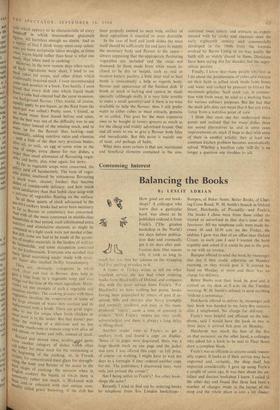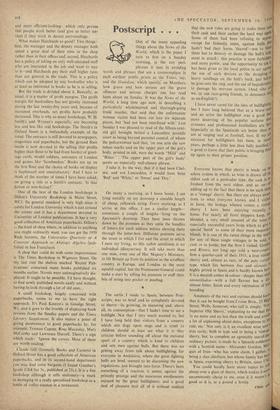Consurnin
g Interest
Balancing the Books
By LESLIE ADRIAN How good are our book- shops? A colleague who knew that a particular book was about to be 'published ordered it from Foyle's (`The greatest bookshop in the World') ten days before publica- tion date and eventually got it six days after pub- lication date. One reason why it took so long to reach her was that her address on the wrapping
had live spelling mistakes in it.
A reader in Turkey writes to tell me what excellent service she has had when ordering books from Blackwell's of Oxford. and compares this with the poor service from Foyle's. 'For Blackwell's we have nothing but praise, books having been dispatched by return of post if re- qUired. bills and receipts also being promptly and correctly rendered and even in the mass- produced "regret- cards a tone of courtesy is evident.' With Foyle's 'orders are very rarely acknowledged and there is always a long delay in filling them.'
Another reader went to Foyle's to get a cookery book and found a copy on .display.
'Some of its pages were dog-eared, there was a large thumb mark on one page and the jacket was torn. 1 \vas offered this copy—at full price, of course---or nothing. 1 might have to wait ten days to a fortnight if they ordered .another copy for me. The publishers, I discovered later. were only just around the corner!'
Am I being unfair to Foyle's? Are other book- shops the same'?
Recently. t tried to find out by ordering books by telephone from five London bookshops-- Burnous, of Baker Street; Better Books, of Char-, jog Cross Road; W. H. Smith's branch in Oxford Street; Hatchards, of Piccadilly—and Foyle's. The books I chose were from those either re- viewed or advertised in that day's issue of the. Spectator. All my telephone calls were .made be- tween 10 and 10.30 a.m. on the Friday, the address I gave was that of,an office near Oxford Circus; in each case .1 said I wanted the book urgently and asked if it could be put in the post to me with an invoice.
Bumpus offered to send the book by messenger that day if they could, otherwise on Monday morning, or they would post it. It arrived b■ hand on Monday at noon and there was no charge for delivery.
Better Books sent their book by .post and it arrived on my desk at 9 .a.m. on the Tuesday morning. W. H. Smith's refused to send anything 'without a remittance.'
Hatchards offered to deliver by messenger and their book was handed to me forty-five minutes after I telephoned. No charge for delivery.
Foyle's were helpful and efficient on the tele- phone, said I would have the book in two or three days; it arrived first post on Monday.
Hatchards was much the best of the five on that occasion; on the other hand, a colleague who asked for a book to be sent to Fleet Street drew a complete blank.
Foyle's was as efficient as anyone could reason- ably expect. It looks as if their service may have improved and, certainly, the shop itself. has improved considerably. I gave up using Foyle's a couple of years ago.. It was then about the un- tidiest and dustiest bookshop I knew. I called in the other day and found that there had been a number of changes made in the layout of the shop and the whole place is now a lot cleaner and more efficient-looking: which only proves that people work better (and give us better ser- vice) if they work in decent surroundings.
What makes Hatchards so good? Two things: first, the manager and the deputy manager both spend a great deal of their time in the shop rather than in their offices and, second, Hatchards has a policy of taking on only well-educated staff who are interested in the job and want to stay in it—and Hatchards pay their staff higher rates than are general in the trade. This is a policy which can be adopted by any bookseller who is at least as interested in books as he is in selling.
But the trade is divided about it. Basically, as usual, it is a matter of profit margins. The profit margin for booksellers has not greatly increased during the last twenty-five years and, because of increased overheads, net profits have probably decreased. This is why so many bookshops, W. H. Smith's and Wyman's especially, are becoming less and less like real bookshops. The Smith's in Oxford Street is a melancholy example of the trend. The entrance is still devoted to newspapers, magazines and paperbacks, but the ground floor inside is now devoted to the selling (for profits higher than those to be had from books) of greet- ings cards, model soldiers, souvenirs of London and games like `Scoobeedoo.' Books are up on the first floor and the choice of books on display is haphazard and unsatisfactory. And I hate to think of the number of times I have been asked, on giving a title to a Smith's assistant, 'Is that fiction or non-fiction?'
One of the best of the London bookshops is Dillon's University Bookshop ih Malet Street, WC1. Its general standard is very high since it caters for London University which is just around the corner and it has a department devoted to University of London publications. It has a very good collection of American paperbacks. Dillon's 1, the kind of shop where, in addition to anything you might ordinarily want, you can get the 1959 Rede lectures, the Universities Quarterly or A Concrete Approach to Abstract Algebra (pub- lished in San Francisco).
A shop that could do with some improvement is The Times -Bookshop in Wigmore Street. On my last visit the shelves marked 'Recent Pub- lications' contained many books published six months earlier. Novels were unimaginatively dis- played. It ought to be possible, I'd have thought, to find newly published novels easily and without having to look through a lot of old ones.
A small bookshop, largely concerned with paperbacks, seems to me to have the right approach. It's Paul Koston's in Goodge Street, WI, and it goes to the trouble of displaying book reviews from the Sunday papers and the Times Literary Supplement. It also makes a point of giving prominence to good paperbacks by, for example, Truman Capote, Rose Macaulay, Mary McCarthy and Lawrence Durrell. There's a sign which reads: 'Ignore the covers. Most of these are worth reading.'
Claude Gill (formerly Books and Careers) in Oxford Street has a good collection of American paperbacks, and in its second-hand department you may find some bargains (I found Gunther's litside USA for 5s., published at 21s.). It is a fine bookshop although it sells stationery—a mark as damaging to a really specialised bookshop as a bottle of coffee essence in a restaurant.



































 Previous page
Previous page